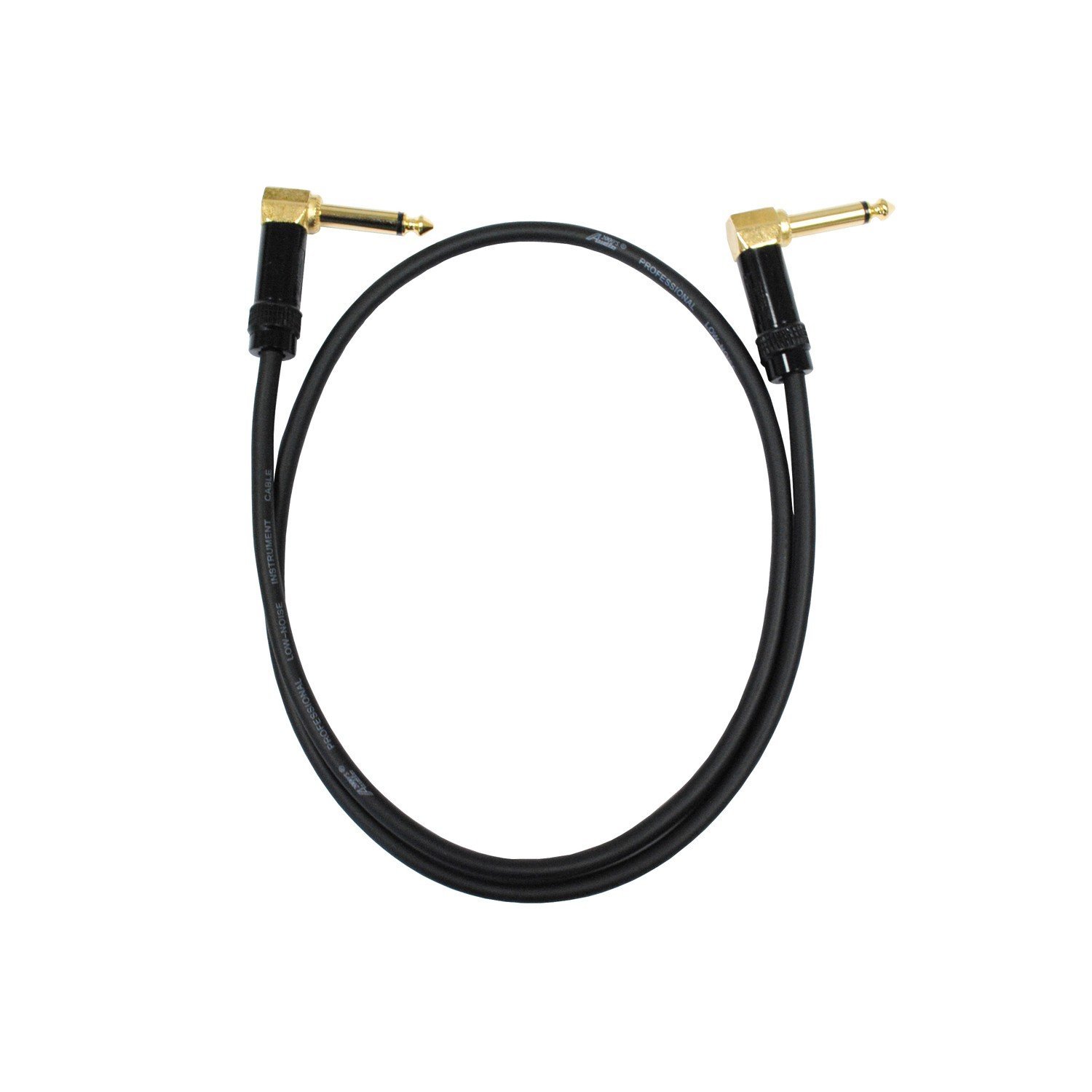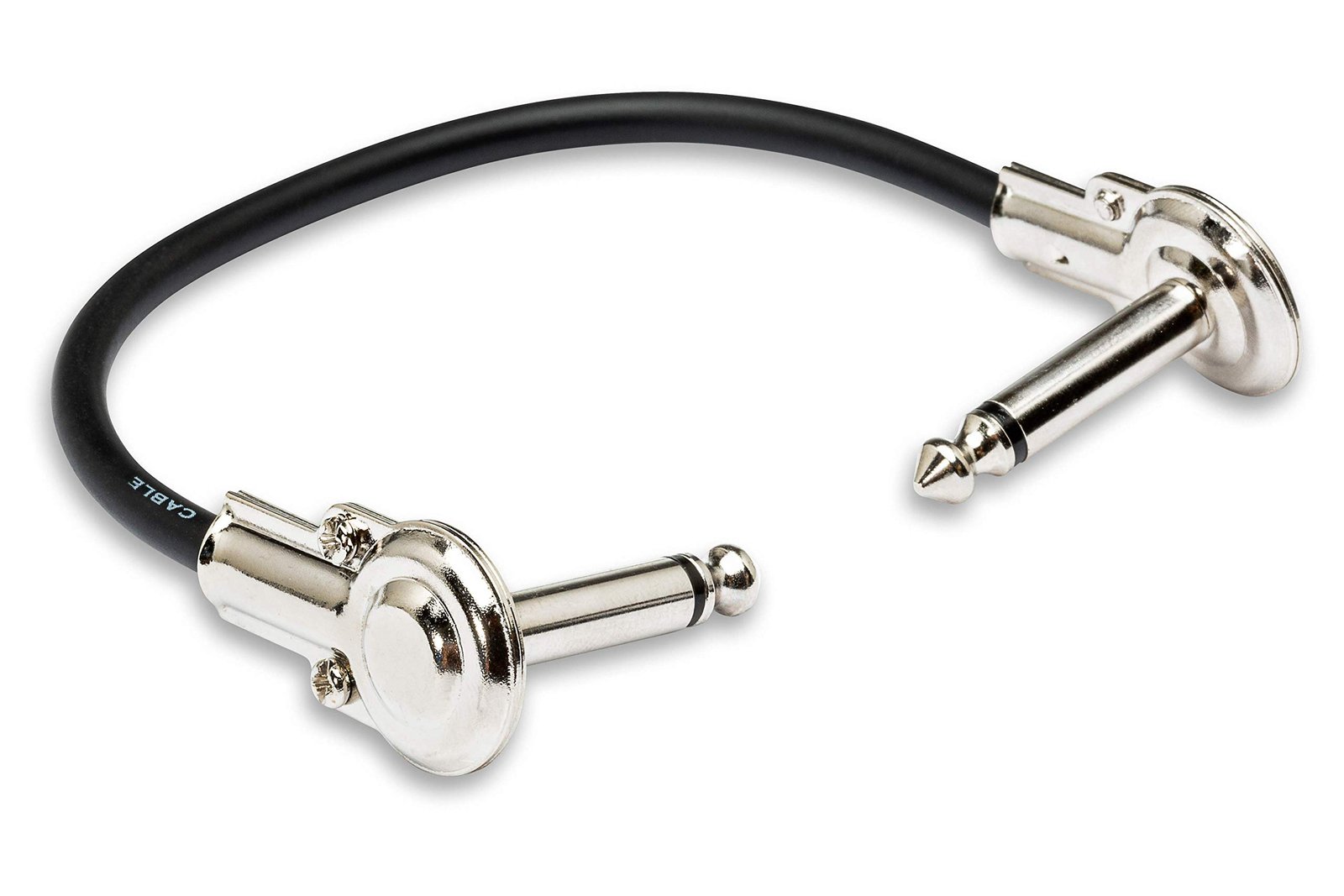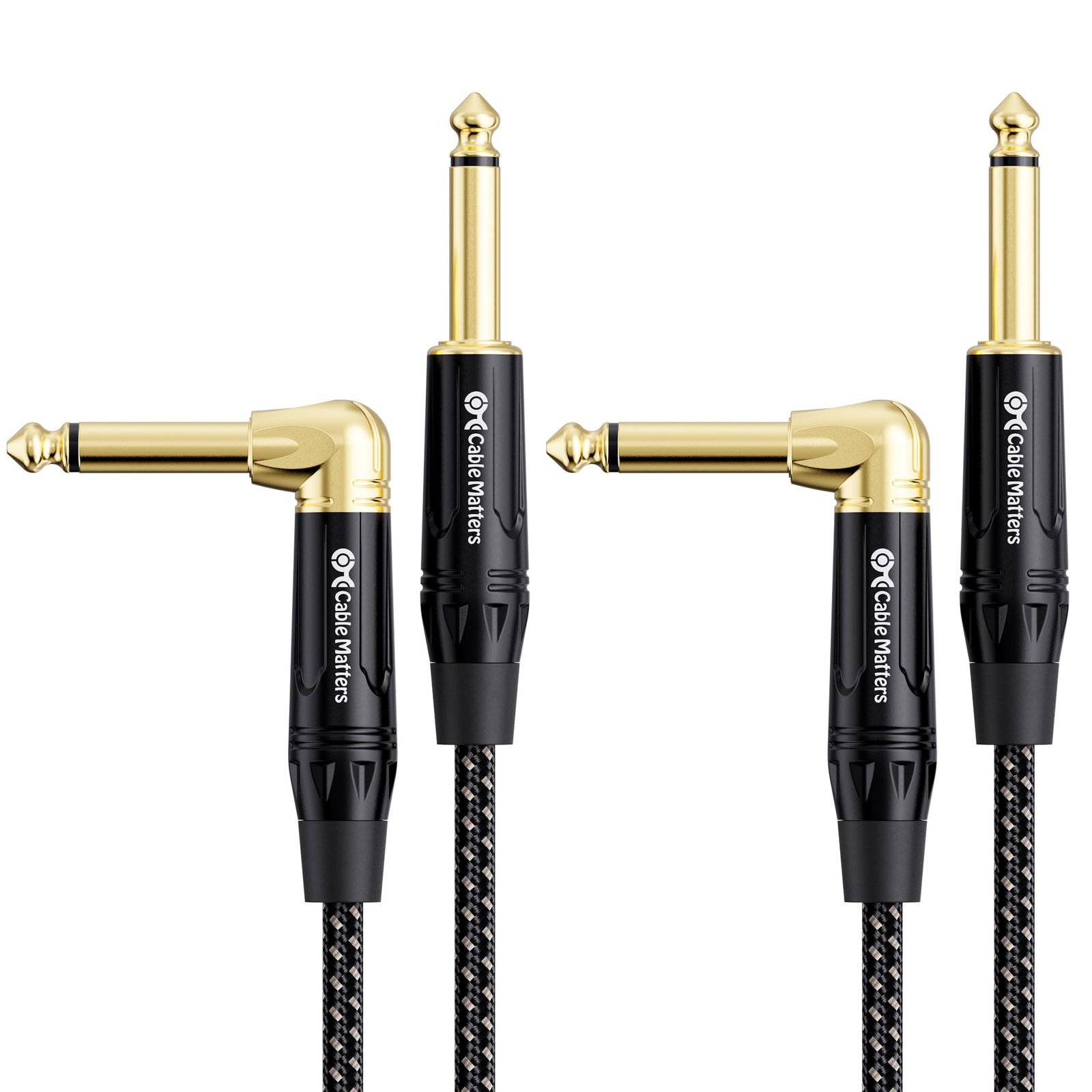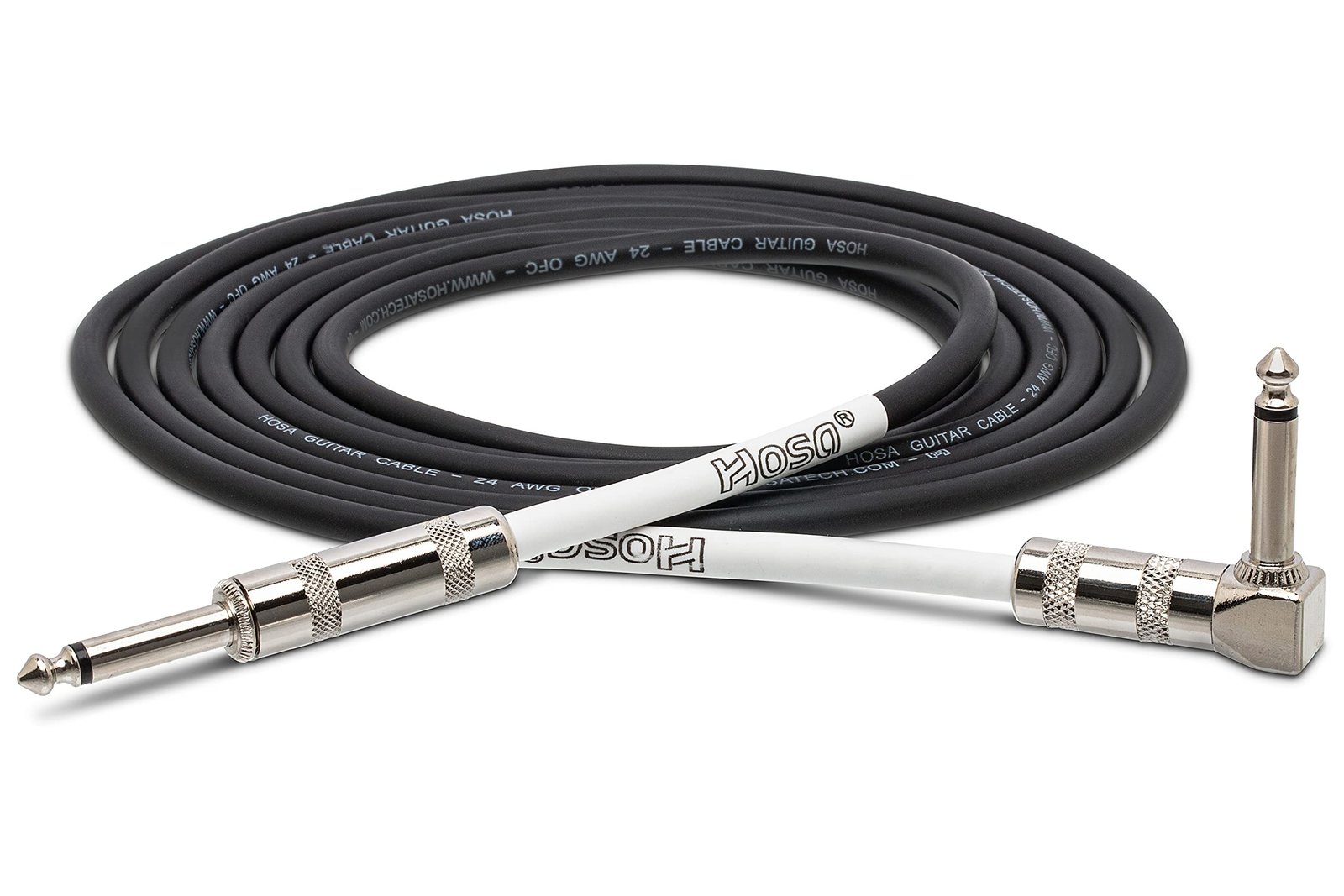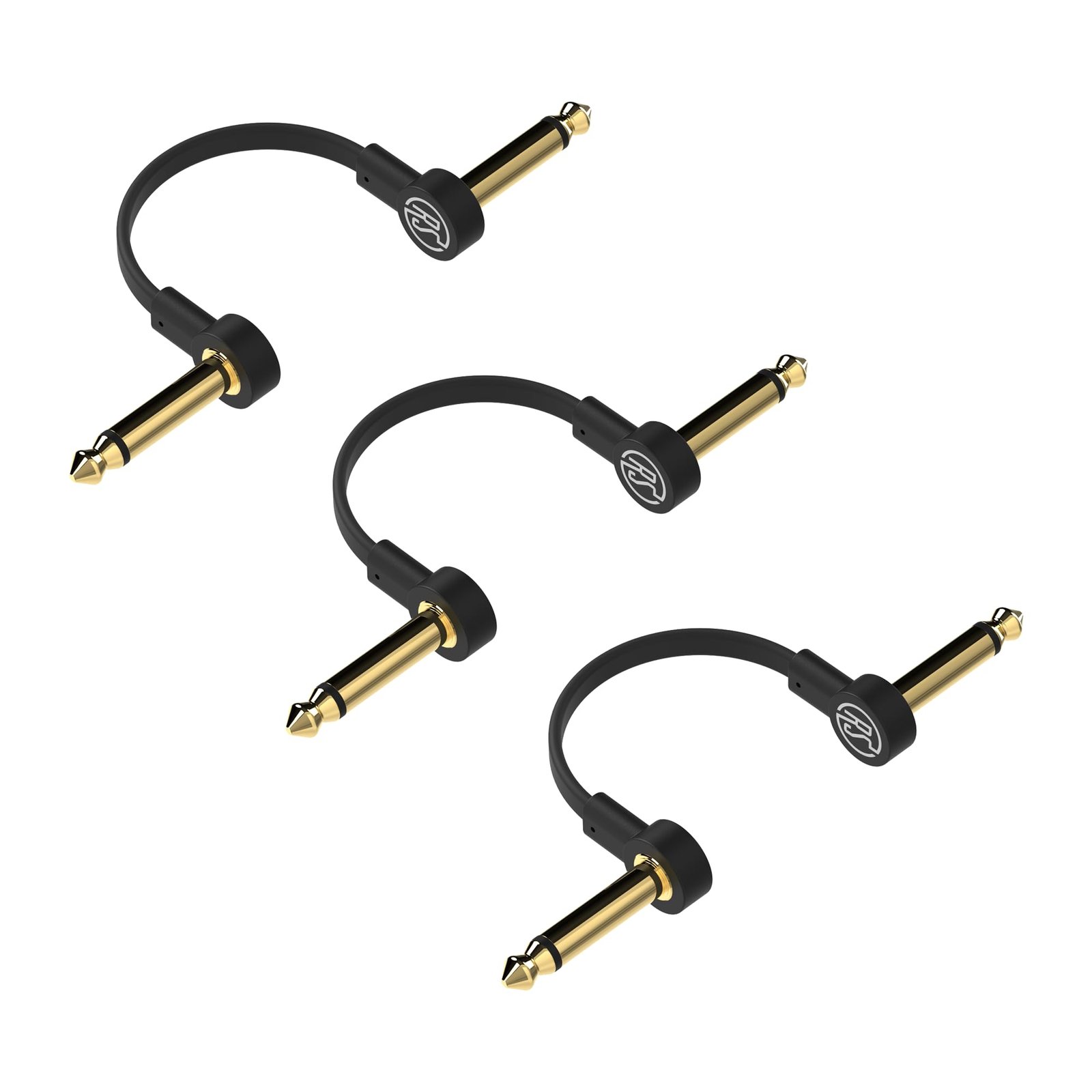Guitar cables are an essential part of any musician’s setup.
They connect your guitar to amps and effects pedals, allowing you to create the sounds you want.
If you play in tight spaces or use small rigs, having the right cable is crucial.
Right-angle guitar cables can save space and help you avoid some awkward moments during performances.
These cables feature connectors that bend at a 90-degree angle.
This design helps you fit your gear more snugly, especially on crowded pedalboards or when you’re playing in small venues.
A good right-angle guitar cable should not only be durable but should also resist tangling.
When choosing a right-angle guitar cable, consider the length, material, and price.
A longer cable might suit larger setups, while a shorter one is better for tight spaces.
Also, look for cables with sturdy connectors to ensure they last longer.
Top Right-Angle Guitar Cables for Tight Spaces
If you’re looking to save space while playing your guitar, right-angle cables are a great choice.
They help you connect your gear without taking up too much room, making them perfect for tight setups.
Check out our top picks to find the best options for your needs.
Audio 2000s E27106 Cable
This cable is a solid choice if you need a reliable option for tight spaces.
- Gold-plated connectors enhance sound quality.
- Flexible design makes it easy to position.
- Durable materials ensure long-term use.
- May not fit every guitar model perfectly.
- Length may be limiting for some setups.
- Can be more expensive than basic cables.
The Audio 2000s E27106 is designed for guitarists who need something that fits well in tight spaces.
With its right-angle connectors, you can easily connect to your guitar or pedals without worrying about awkward angles.
The gold-plated connectors provide clear audio signals, making it a suitable choice for both practice and performances.
Its spiral shield helps reduce interference.
You can be sure that this cable will help keep your sound clean.
Another great feature is its flexibility.
The soft PVC jacket makes it easy to maneuver without tangling.
This is especially useful when you’re dealing with multiple connections on your pedalboard.
For those looking for durability, this cable holds up well.
It’s built to last, taking the wear and tear that comes with regular use.
Overall, it’s a reliable cable that serves its purpose well.
Hosa IRG-100.5 Right-Angle Guitar Cable
This cable is a solid choice if you need to connect your guitar pedals without taking up too much space.
- Low-profile design helps fit pedals closely.
- Metal plugs provide durability for live use.
- Good signal clarity with oxygen-free copper.
- Some users feel the connectors might seem cheap.
- Limited length may not suit all setups.
- Not as flexible as some other cables.
These Hosa IRG-100.5 cables are made for tight spaces and are perfect for pedal boards.
The right-angle design allows your pedals to sit close together, making your setup neat and tidy.
You won’t have to worry about cables getting in the way while you’re playing.
The plugs are all-metal, which adds to their durability.
This is especially useful if you perform live and need reliable gear.
With oxygen-free copper, the cables enhance sound quality, reducing any signal loss that can happen with lesser cables.
While they do the job well, some users mention that the connectors might feel a bit flimsy.
For those with more extensive setups, the 6-inch length could be a drawback.
Overall, if you’re looking to make the most of your pedal board space, this cable is a great option.
Cable Matters Right Angle Guitar Cables
These cables are a solid choice if you need something that fits well in tight spots.
- Right angle design reduces space and minimizes trip hazards.
- Braided outer layer adds durability and a stylish look.
- Comes in a cost-effective 2-pack for extra convenience.
- Some users find the cables less flexible than expected.
- Sound quality is acceptable, but not outstanding for audiophiles.
- The 6-foot length may limit use in larger setups.
These cables from Cable Matters stand out for their practical right-angle design.
This feature makes them ideal for cramped spaces, helping to keep your setup neat and safe.
The braided jacket not only enhances durability but also gives them a unique appearance.
Compatibility is another strong point.
You can easily connect various instruments to amplifiers, mixers, and more.
This flexibility means you can use these cables with guitars, basses, ukuleles, and other gear.
One consideration is the stiffness of the cable.
While the rugged build is great for durability, some users have noted that it can be a bit rigid.
This could limit how easily you can maneuver them in certain setups.
Nevertheless, these cables provide a great value, especially when you need reliable connections at a fair price.
Hosa GTR-205R Cable
You may want to grab this cable if you’re looking for reliable performance with tight space use in mind.
- Sturdy all-metal connectors improve durability.
- Braided design adds flexibility and strength.
- Great clarity in signal transmission.
- Some users find the length limited.
- Right-angle jack might not fit all setups.
- Reports of quality issues from a few customers.
This Hosa GTR-205R cable is designed for electric guitars and amplifiers.
Its right-angle connector is perfect for fitting into tight spots without putting pressure on your jacks.
The cable is also braided, which makes it flexible while avoiding tangles.
Many musicians appreciate the durability of the all-metal plugs.
The cable is made with oxygen-free copper, which helps maintain clear sound quality.
This means you can expect a clean connection without unnecessary noise.
While this cable is a solid choice overall, keep in mind that it’s only 5 feet long.
Some players might find this limiting, depending on how they set up their gear.
A few reviews also mention that the right-angle fitting may not work for every guitar model.
If you’re looking for a balance of quality and affordability, the Hosa GTR-205R is worth considering.
Rock Stock Guitar Pedal Patch Cables
These cables are a solid choice for anyone who needs compact and durable options for their pedal board.
- Durable connectors with gold plating
- Various lengths to fit your setup
- Great low noise performance
- Might be too short for some setups
- Limited color options
- Slightly higher price than basic cables
If you want to tidy up your pedal board, the Rock Stock Guitar Pedal Patch Cables come ready to help.
With their right-angle connectors, you can save space and connect your pedals neatly.
The gold-tipped connectors ensure good audio quality, so you won’t lose that sweet sound.
These cables are not only designed for functionality but also built for durability, ensuring they can withstand the rigors of frequent use.
As musicians often seek the best tools to enhance their setup, these are undoubtedly among the top short patch cables for pedals available on the market.
Upgrade your rig with the Rock Stock Guitar Pedal Patch Cables, and experience a cleaner signal path and more organized setup.
There are different lengths to choose from.
Whether you need a small 2-inch or a longer 24-inch cable, this brand has options.
This variety means you can make your setup as clean as possible without sacrificing sound quality.
The braided copper shielding helps reduce noise, making sure your guitar tone stays clear.
Plus, these cables are designed to be thin and flexible.
This flexibility helps when you’re trying to fit everything together in a tight space without any hassle.
Buying Guide
When choosing the right-angle guitar cables for tight spaces, consider these important features:
Length
- Standard Lengths: Cables typically come in various lengths. Pick one that suits your setup.
- Shorter Cables: Great for tight spaces to reduce clutter.
Connector Type
- Right-Angle Connectors: These fit well in small areas and won’t stick out.
- Durability: Look for sturdy connectors that won’t break easily.
Cable Thickness
- Gauge Matters: Thicker cables can be more durable but may be less flexible.
- Flexibility: Choose cables that bend easily in tight spots without damage.
Shielding
- Noise Reduction: Good shielding can reduce interference and noise.
- Types of Shielding: Look for cables with braided or foil shielding for better performance.
Price Range
- Set a Budget: Prices vary widely. Decide how much you want to spend.
- Quality vs. Cost: Sometimes spending a little more ensures better sound and durability.
Keep these tips in mind when shopping.
This way, you can find the best right-angle guitar cables for your needs.

